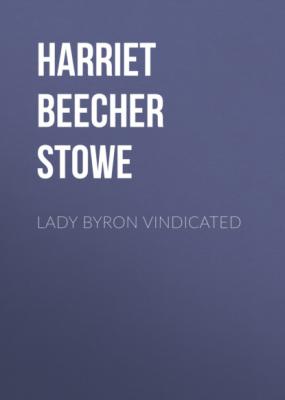Lady Byron Vindicated. Гарриет Бичер-Стоу
Читать онлайн.| Название | Lady Byron Vindicated |
|---|---|
| Автор произведения | Гарриет Бичер-Стоу |
| Жанр | Языкознание |
| Серия | |
| Издательство | Языкознание |
| Год выпуска | 0 |
| isbn | 4064066180225 |
Harriet Beecher Stowe
Lady Byron Vindicated
A history of the Byron controversy from its beginning in 1816 to the present time
Published by Good Press, 2019
EAN 4064066180225
Table of Contents
CHAPTER II. THE ATTACK ON LADY BYRON.
CHAPTER III. RÉSUMÉ OF THE CONSPIRACY.
CHAPTER IV. RESULTS AFTER LORD BYRON’S DEATH.
CHAPTER V. THE ATTACK ON LADY BYRON’S GRAVE.
CHAPTER I. LADY BYRON AS I KNEW HER.
CHAPTER II. LADY BYRON’S STORY AS TOLD ME.
CHAPTER III. CHRONOLOGICAL SUMMARY OF EVENTS.
CHAPTER IV. THE CHARACTER OF THE TWO WITNESSES COMPARED.
CHAPTER V. THE DIRECT ARGUMENT TO PROVE THE CRIME.
CHAPTER VI. PHYSIOLOGICAL ARGUMENT.
CHAPTER VII. HOW COULD SHE LOVE HIM?
PART III. MISCELLANEOUS DOCUMENTS.
THE TRUE STORY OF LADY BYRON’S LIFE, AS ORIGINALLY PUBLISHED IN ‘THE ATLANTIC MONTHLY.’
LORD LINDSAY’S LETTER TO THE LONDON ‘TIMES.’ TO THE EDITOR OF ‘THE TIMES.’
DR. FORBES WINSLOW’S LETTER TO THE LONDON ‘TIMES.’
EXTRACT FROM LORD BYRON’S EXPUNGED LETTER.
LETTERS OF LADY BYRON TO H. C. ROBINSON
THREE DOMESTIC POEMS BY LORD BYRON.
PART I.
CHAPTER I. INTRODUCTION.
The interval since my publication of ‘The True Story of Lady Byron’s Life’ has been one of stormy discussion and of much invective.
I have not thought it necessary to disturb my spirit and confuse my sense of right by even an attempt at reading the many abusive articles that both here and in England have followed that disclosure. Friends have undertaken the task for me, giving me from time to time the substance of anything really worthy of attention which came to view in the tumult.
It appeared to me essential that this first excitement should in a measure spend itself before there would be a possibility of speaking to any purpose. Now, when all would seem to have spoken who can speak, and, it is to be hoped, have said the utmost they can say, there seems a propriety in listening calmly, if that be possible, to what I have to say in reply.
And, first, why have I made this disclosure at all?
To this I answer briefly, Because I considered it my duty to make it.
I made it in defence of a beloved, revered friend, whose memory stood forth in the eyes of the civilised world charged with most repulsive crimes, of which I certainly knew her innocent.
I claim, and shall prove, that Lady Byron’s reputation has been the victim of a concerted attack, begun by her husband during her lifetime, and coming to its climax over her grave. I claim, and shall prove, that it was not I who stirred up this controversy in this year 1869. I shall show who did do it, and who is responsible for bringing on me that hard duty of making these disclosures, which it appears to me ought to have been made by others.
I claim that these facts were given to me unguarded by any promise or seal of secrecy, expressed or implied; that they were lodged with me as one sister rests her story with another for sympathy, for counsel, for defence. Never did I suppose the day would come that I should be subjected to so cruel an anguish as this use of them has been to me. Never did I suppose that—when those kind hands, that had shed nothing but blessings, were lying in the helplessness of death, when that gentle heart, so sorely tried and to the last so full of love, was lying cold in the tomb—a countryman in England could be found to cast the foulest slanders on her grave, and not one in all England to raise an effective voice in her defence.
I admit the feebleness of my plea, in point of execution. It was written in a state of exhausted health, when no labour of the kind was safe for me—when my hand had not strength to hold the pen, and I was forced to dictate to another.
I have been told that I have no reason to congratulate myself on it as a literary effort. O my brothers and sisters! is there then nothing in the world to think of but literary efforts? I ask any man with a heart in his bosom, if he had been obliged to tell a story so cruel, because his mother’s grave gave no rest from slander—I ask any woman who had been forced to such a disclosure to free a dead sister’s name from grossest insults, whether she would have thought of making this work of bitterness a literary success?
Are the cries of the oppressed, the gasps of the dying, the last prayers of mothers—are any words wrung like drops of blood from the human heart to be judged as literary efforts?
My fellow-countrymen of America, men of the press, I have done you one act of justice—of all your bitter articles, I have read not one. I shall never be troubled in the future time by the remembrance of any unkind word you have said of me, for at this moment I recollect not one. I had such faith in you, such
